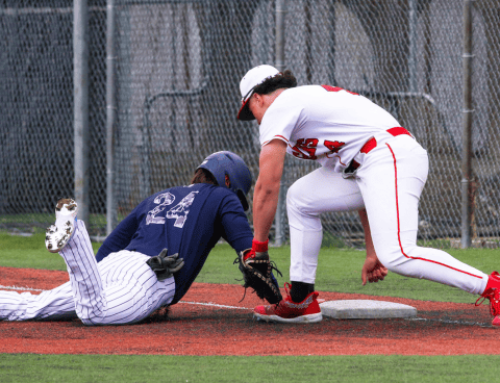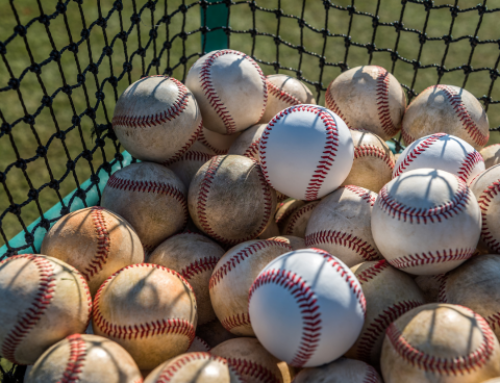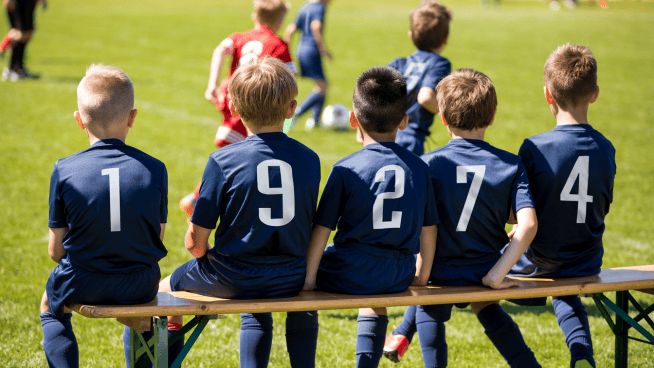EXCLUSIVE: Aubrey Huff Mounts an MLB Comeback After Battling Depression and Injuries During 3 Years Away From the Game
Aubrey Huff thought he was having a heart attack.
He’d woken up at 3:00 a.m. to use the bathroom in his Manhattan hotel room, his mind still disturbed by his fielding mishap, which had cost his San Francisco Giants a game against the New York Mets earlier that night. A first baseman who had been moved over to second base for the first time in his 13-year career, Huff had forgotten to cover second on a double-play ball hit to the shortstop by the Mets Justin Turner in the bottom of the 9th inning with the score tied 4-4. Everyone was safe and the bases were now loaded. On the following play, a throwing error by catcher Buster Posey gave the Mets a walk-off win.
It was only late April in 2012, the season not even 20 games old. But something hadn’t been right with Huff since he had won a World Series with the Giants two years earlier, and his error in an otherwise meaningless early season game brought those feelings bubbling to the surface.
Huff’s heart sounded like a bass guitar thumping out of an amplifier. He needed to go home, back to Tampa, Florida, to see his wife and two kids. He scrambled around his hotel room, packing his belongings as fast as he could. Then, he was gone.
“I wore my pajamas to the airport,” Huff said. “I didn’t tell my coaches, didn’t tell anybody. I just left.”
But his heart refused to relax. It was not until 8:00 a.m., when he landed in Tampa, that his mind and body begin to return to normalcy. Finally calm, Huff couldn’t believe what he had just done. He called Giants manager Bruce Bochy to tell him he’d had a family emergency and had to fly home. Bochy was understanding and told Huff to meet the team in Cincinnati, where they’d be playing the following night.
Huff agreed, and the next morning he began packing his things for the trip to Cincinnati. As he placed clothes and toiletries into his bag, his heart left normalcy again and returned to overdrive. After being taken to see a therapist, Huff was diagnosed with severe anxiety. It was the beginning of the end of his career.
“I went on the disabled list right then and there, and I was never the same again,” Huff said. “I lost my starting job. I was quiet in the clubhouse, in the corner the entire second half of the season. I was a ghost. It was in the papers. People knew I was dealing with anxiety. I was on Xanax, the whole nine yards.”
Huff, who was also battling an injured left hip, played in just 52 regular-season games in 2012, hitting a paltry .192, by the far the worst batting average of his career. When the Giants made the playoffs, he was what he called a “courtesy” addition to the post-season roster, more as a sign of respect than an expectation he would contribute. He totaled just nine at-bats as the Giants surged to another World Series. In his final plate appearance, in Game 2, he struck out against Detroit Tigers pitcher Doug Fister. The Giants swept the Tigers, giving Huff his second World Series ring in the past three seasons. But as champagne was popped and hugs were distributed in the locker room, he was despondent.
“People ask me all the time, ‘It must be cool to walk away a champion.’ And I say ‘Yeah,’ but deep down I’m lying to myself,” Huff said. “I was miserable that season. I hated baseball, because I really thought baseball was the root cause of all my problems.”
As it turns out, Huff hadn’t really enjoyed baseball since his first World Series win in 2010. He hit .290 that year, mashing 26 home runs and driving in 86 RBIs. He knocked in eight more runs during the playoffs. The Giants dispatched the Texas Rangers in five games, and after 11 years of playing baseball, Huff had reached the pinnacle. Aubrey Huff was a champion.
His exuberance lasted exactly one night. When he awoke the next morning, he was consumed by existential dread.
“I remember waking up the next morning and looking at my wife and just laughing. Like, ‘Now what?’” Huff said. “All my life I’ve been chasing this dream. I’m 33 years old, I’ve accomplished the dream I’ve always wanted. So now what? It was kind of a sickening feeling in a way.”
Huff retired after the 2012 season, his second ring the neatly tied bow on an immensely successful career.
“As far as playing, I’ve had my fun,” Huff said at the time. “I’ve won some World Series, put up some good numbers and made some money. I’m very happy with how my career went, and I’m done.”
But the demons that plagued Huff worsened in retirement. His depression and anxiety hounded him, to the point where he became suicidal. His hip was still busted. Without a baseball diamond on which to seek refuge, Huff was lost.
“Everything stops,” Huff said. “That sound of 40,000 people screaming every day, it just stops.”
Then one day about two years ago, Huff stopped too. He stopped wallowing in his misery. He immersed himself in self-help books. He canceled his cable service and stopped checking social media. For the first time in a long time, he felt free.
“You have to get to a point in your life where you’re just pissed off,” Huff said. “You’ve had enough, and you either continue to go down this road, or you look to change something in your mind.”
Within six months, Huff was a different person. He started to view his surroundings differently, appreciating the paradisical climate of his home in San Diego, the two shiny World Series rings in his room and his wife and two sons.
“I blamed everyone else for my problems,” Huff said. “I was a bad father and husband. I wasn’t appreciative of the things I had around me. It wasn’t baseball that I hated, it was myself. I said, ‘I’m done living like this.’”
Still, baseball never left his mind. Upset about how he went out, an afterthought on a World Series winning team, he could think of nothing but the game. He had pulled himself out of the mental rubble he had been buried under.
Despite being 38 years old, Huff began to dream. He didn’t want to just return to baseball as the veteran who plays once every three days and provides “leadership” to the youngsters in the locker room. He wanted to come back, have the best season of his career and make the All-Star Game for the first time. In his mind, none of that sounded unreasonable.
“You may think I’m crazy, and I don’t care,” Huff said. “Because you know what? One day I’m going to be dead. So I don’t care what other people think. Laugh at me all you want. This is about something bigger than myself.”
There were a couple of issues that needed to be addressed before Huff could even think about donning a major league jersey again. He had done almost no physical activity in three years, much less pick up a bat and glove, and he was still dealing with an ailing hip that forced him to walk with a limp.
Six months ago, he was introduced to Jason Huntley, a trainer at STACK Velocity Sports Performance in San Diego, through a mutual friend. Huntley was looking for a professional baseball player to help endorse the ARP Wave System, a neuro-therapy machine that helps athletes recover from injuries, and he knew that Huff was dealing with nagging hip discomfort.
Initially skeptical, Huff agreed to a 20-day trial with the machine, if for no other reason than to rid himself of the pain in his left hip. After 10 sessions, the limp he had been dealing with for two years had completely dissipated. He could run again. He discovered that the blood pressure medication he was taking had sped up the onset of arthritis, which was affecting his hip, so he ditched it. And the small baseball-shaped seed that had been slowly growing in his mind began to expand to the size of a softball.
Huntley said, “I started joking around, saying, ‘Within a few weeks you’re going to want to play baseball again if we can get you feeling better physically and mentally—better than you ever have.”
That was all Huff needed to hear.
“I just wanted somebody else to say it where it didn’t sound crazy to me,” Huff said. “It triggered something in me, and I said, let’s do it.”

Aubrey Huff uses the ARP Wave machine at STACK Velocity Sports Performance to rehabilitate his injured hip
Huff began training with Huntley full time, coming in every day at 10:00 a.m. and working through everything from isometric holds to plyometrics to the Bench Press, with limited rest between sets. He dropped 10 pounds in the first month, from 223 down to 213.
Huff has a monthly pass to a hitting facility next door to Velocity, where he works through drills with Huntley. His swing is slowed down while he’s connected to electrical stimuli, which allowed his brain to receive hundreds of impulses telling him when his swing is perfect so he can repeat that motion over and over again. He said he’s never felt better, mentally or physically.
“He has responded as well as I think anybody could,” Huntley said. “He has a drive and toughness that’s rooted in the desire that he has to be really, really good. When we train, he keeps thinking about what the means to the end are, and the end is the most important part.”
The end also sounds a little bit nuts.
Huff’s best season was in 2003, when he was a member of the Tampa Bay Rays. That year he hit .311 with 34 home runs and 107 RBIs. Huff wants to top those numbers. He wants to hit .320. He wants to smack 40 home runs. And he wants to knock in 110 runs.
The insanity of that vision is not lost on Huff, who will turn 39 in December, but it isn’t all about him.
There’s a spiritual component to Huff’s improbable return. He says he’s seen too many signs prodding him to return to baseball to ignore. Like the hitting facility located directly next to where he’s training. Like the 2016 All-Star Game scheduled to be held at Petco Park in his hometown of San Diego. He not only wants to return to baseball, he has to return, so he can inspire people, so he can touch lives, so he can use the platform he’s on for good. He’s already seeing himself hoisting the All-Star MVP trophy, then donating the free car that comes with it to charity. And if Huff can see it, he believes it.
But the reality of his situation is impossible to ignore. No matter how fit he purports to be, or how good his swing feels, Huff is an almost-40-year-old man who hasn’t played a lick of baseball in three years. And to reach the lofty goals he’s set for himself, he must take away a roster spot from an everyday player on a major league team.
“I think it would be difficult for a position player to take three years off, especially at that age, and be an everyday player,” an A.L. manager told us. “Take a look around the league. You do not see many players playing daily above the age of 35 any more. If he shows he can still hit at this level, I would think he would be welcome on an A.L. team to pinch-hit and play three or four days a week if his body can handle it.”
Huff knows all this. Despite his visions of grandeur, he is acutely self-aware. It hasn’t deterred him yet, though. In November, he plans to leave for the Dominican Republic to play winter ball and show MLB teams just how serious he is. He’ll then return to Huntley in December or January, depending on how he plays, to continue to train until February, when he hopes to join a big league team for spring training.
Huff maintains he’s the best he’s ever been. But if his dream return stalls, he’ll be OK with breaking up with baseball for good.
“I’ve found a place where I feel so at peace,” Huff said. “I’m so appreciative of the things I have now. Ninety-nine percent of the world would give their left nut to have what I have.”
But Huff doesn’t feel like that end is near. After all he’s been through, it’s as if his baseball career, and his life, are starting over again.
“I’ve done a lot of cool things in baseball. I’ve lived an unbelievable life and I’m not even 39,” he said. “But I think it’s going to get even better. I didn’t believe that three years ago. I thought my life was over. I didn’t think it had any purpose or value. I put too much emphasis on myself and not other people. And that’s when you’re going to find ultimate happiness.”
RECOMMENDED FOR YOU
MOST POPULAR
EXCLUSIVE: Aubrey Huff Mounts an MLB Comeback After Battling Depression and Injuries During 3 Years Away From the Game
Aubrey Huff thought he was having a heart attack.
He’d woken up at 3:00 a.m. to use the bathroom in his Manhattan hotel room, his mind still disturbed by his fielding mishap, which had cost his San Francisco Giants a game against the New York Mets earlier that night. A first baseman who had been moved over to second base for the first time in his 13-year career, Huff had forgotten to cover second on a double-play ball hit to the shortstop by the Mets Justin Turner in the bottom of the 9th inning with the score tied 4-4. Everyone was safe and the bases were now loaded. On the following play, a throwing error by catcher Buster Posey gave the Mets a walk-off win.
It was only late April in 2012, the season not even 20 games old. But something hadn’t been right with Huff since he had won a World Series with the Giants two years earlier, and his error in an otherwise meaningless early season game brought those feelings bubbling to the surface.
Huff’s heart sounded like a bass guitar thumping out of an amplifier. He needed to go home, back to Tampa, Florida, to see his wife and two kids. He scrambled around his hotel room, packing his belongings as fast as he could. Then, he was gone.
“I wore my pajamas to the airport,” Huff said. “I didn’t tell my coaches, didn’t tell anybody. I just left.”
But his heart refused to relax. It was not until 8:00 a.m., when he landed in Tampa, that his mind and body begin to return to normalcy. Finally calm, Huff couldn’t believe what he had just done. He called Giants manager Bruce Bochy to tell him he’d had a family emergency and had to fly home. Bochy was understanding and told Huff to meet the team in Cincinnati, where they’d be playing the following night.
Huff agreed, and the next morning he began packing his things for the trip to Cincinnati. As he placed clothes and toiletries into his bag, his heart left normalcy again and returned to overdrive. After being taken to see a therapist, Huff was diagnosed with severe anxiety. It was the beginning of the end of his career.
“I went on the disabled list right then and there, and I was never the same again,” Huff said. “I lost my starting job. I was quiet in the clubhouse, in the corner the entire second half of the season. I was a ghost. It was in the papers. People knew I was dealing with anxiety. I was on Xanax, the whole nine yards.”
Huff, who was also battling an injured left hip, played in just 52 regular-season games in 2012, hitting a paltry .192, by the far the worst batting average of his career. When the Giants made the playoffs, he was what he called a “courtesy” addition to the post-season roster, more as a sign of respect than an expectation he would contribute. He totaled just nine at-bats as the Giants surged to another World Series. In his final plate appearance, in Game 2, he struck out against Detroit Tigers pitcher Doug Fister. The Giants swept the Tigers, giving Huff his second World Series ring in the past three seasons. But as champagne was popped and hugs were distributed in the locker room, he was despondent.
“People ask me all the time, ‘It must be cool to walk away a champion.’ And I say ‘Yeah,’ but deep down I’m lying to myself,” Huff said. “I was miserable that season. I hated baseball, because I really thought baseball was the root cause of all my problems.”
As it turns out, Huff hadn’t really enjoyed baseball since his first World Series win in 2010. He hit .290 that year, mashing 26 home runs and driving in 86 RBIs. He knocked in eight more runs during the playoffs. The Giants dispatched the Texas Rangers in five games, and after 11 years of playing baseball, Huff had reached the pinnacle. Aubrey Huff was a champion.
His exuberance lasted exactly one night. When he awoke the next morning, he was consumed by existential dread.
“I remember waking up the next morning and looking at my wife and just laughing. Like, ‘Now what?’” Huff said. “All my life I’ve been chasing this dream. I’m 33 years old, I’ve accomplished the dream I’ve always wanted. So now what? It was kind of a sickening feeling in a way.”
Huff retired after the 2012 season, his second ring the neatly tied bow on an immensely successful career.
“As far as playing, I’ve had my fun,” Huff said at the time. “I’ve won some World Series, put up some good numbers and made some money. I’m very happy with how my career went, and I’m done.”
But the demons that plagued Huff worsened in retirement. His depression and anxiety hounded him, to the point where he became suicidal. His hip was still busted. Without a baseball diamond on which to seek refuge, Huff was lost.
“Everything stops,” Huff said. “That sound of 40,000 people screaming every day, it just stops.”
Then one day about two years ago, Huff stopped too. He stopped wallowing in his misery. He immersed himself in self-help books. He canceled his cable service and stopped checking social media. For the first time in a long time, he felt free.
“You have to get to a point in your life where you’re just pissed off,” Huff said. “You’ve had enough, and you either continue to go down this road, or you look to change something in your mind.”
Within six months, Huff was a different person. He started to view his surroundings differently, appreciating the paradisical climate of his home in San Diego, the two shiny World Series rings in his room and his wife and two sons.
“I blamed everyone else for my problems,” Huff said. “I was a bad father and husband. I wasn’t appreciative of the things I had around me. It wasn’t baseball that I hated, it was myself. I said, ‘I’m done living like this.’”
Still, baseball never left his mind. Upset about how he went out, an afterthought on a World Series winning team, he could think of nothing but the game. He had pulled himself out of the mental rubble he had been buried under.
Despite being 38 years old, Huff began to dream. He didn’t want to just return to baseball as the veteran who plays once every three days and provides “leadership” to the youngsters in the locker room. He wanted to come back, have the best season of his career and make the All-Star Game for the first time. In his mind, none of that sounded unreasonable.
“You may think I’m crazy, and I don’t care,” Huff said. “Because you know what? One day I’m going to be dead. So I don’t care what other people think. Laugh at me all you want. This is about something bigger than myself.”
There were a couple of issues that needed to be addressed before Huff could even think about donning a major league jersey again. He had done almost no physical activity in three years, much less pick up a bat and glove, and he was still dealing with an ailing hip that forced him to walk with a limp.
Six months ago, he was introduced to Jason Huntley, a trainer at STACK Velocity Sports Performance in San Diego, through a mutual friend. Huntley was looking for a professional baseball player to help endorse the ARP Wave System, a neuro-therapy machine that helps athletes recover from injuries, and he knew that Huff was dealing with nagging hip discomfort.
Initially skeptical, Huff agreed to a 20-day trial with the machine, if for no other reason than to rid himself of the pain in his left hip. After 10 sessions, the limp he had been dealing with for two years had completely dissipated. He could run again. He discovered that the blood pressure medication he was taking had sped up the onset of arthritis, which was affecting his hip, so he ditched it. And the small baseball-shaped seed that had been slowly growing in his mind began to expand to the size of a softball.
Huntley said, “I started joking around, saying, ‘Within a few weeks you’re going to want to play baseball again if we can get you feeling better physically and mentally—better than you ever have.”
That was all Huff needed to hear.
“I just wanted somebody else to say it where it didn’t sound crazy to me,” Huff said. “It triggered something in me, and I said, let’s do it.”

Aubrey Huff uses the ARP Wave machine at STACK Velocity Sports Performance to rehabilitate his injured hip
Huff began training with Huntley full time, coming in every day at 10:00 a.m. and working through everything from isometric holds to plyometrics to the Bench Press, with limited rest between sets. He dropped 10 pounds in the first month, from 223 down to 213.
Huff has a monthly pass to a hitting facility next door to Velocity, where he works through drills with Huntley. His swing is slowed down while he’s connected to electrical stimuli, which allowed his brain to receive hundreds of impulses telling him when his swing is perfect so he can repeat that motion over and over again. He said he’s never felt better, mentally or physically.
“He has responded as well as I think anybody could,” Huntley said. “He has a drive and toughness that’s rooted in the desire that he has to be really, really good. When we train, he keeps thinking about what the means to the end are, and the end is the most important part.”
The end also sounds a little bit nuts.
Huff’s best season was in 2003, when he was a member of the Tampa Bay Rays. That year he hit .311 with 34 home runs and 107 RBIs. Huff wants to top those numbers. He wants to hit .320. He wants to smack 40 home runs. And he wants to knock in 110 runs.
The insanity of that vision is not lost on Huff, who will turn 39 in December, but it isn’t all about him.
There’s a spiritual component to Huff’s improbable return. He says he’s seen too many signs prodding him to return to baseball to ignore. Like the hitting facility located directly next to where he’s training. Like the 2016 All-Star Game scheduled to be held at Petco Park in his hometown of San Diego. He not only wants to return to baseball, he has to return, so he can inspire people, so he can touch lives, so he can use the platform he’s on for good. He’s already seeing himself hoisting the All-Star MVP trophy, then donating the free car that comes with it to charity. And if Huff can see it, he believes it.
But the reality of his situation is impossible to ignore. No matter how fit he purports to be, or how good his swing feels, Huff is an almost-40-year-old man who hasn’t played a lick of baseball in three years. And to reach the lofty goals he’s set for himself, he must take away a roster spot from an everyday player on a major league team.
“I think it would be difficult for a position player to take three years off, especially at that age, and be an everyday player,” an A.L. manager told us. “Take a look around the league. You do not see many players playing daily above the age of 35 any more. If he shows he can still hit at this level, I would think he would be welcome on an A.L. team to pinch-hit and play three or four days a week if his body can handle it.”
Huff knows all this. Despite his visions of grandeur, he is acutely self-aware. It hasn’t deterred him yet, though. In November, he plans to leave for the Dominican Republic to play winter ball and show MLB teams just how serious he is. He’ll then return to Huntley in December or January, depending on how he plays, to continue to train until February, when he hopes to join a big league team for spring training.
Huff maintains he’s the best he’s ever been. But if his dream return stalls, he’ll be OK with breaking up with baseball for good.
“I’ve found a place where I feel so at peace,” Huff said. “I’m so appreciative of the things I have now. Ninety-nine percent of the world would give their left nut to have what I have.”
But Huff doesn’t feel like that end is near. After all he’s been through, it’s as if his baseball career, and his life, are starting over again.
“I’ve done a lot of cool things in baseball. I’ve lived an unbelievable life and I’m not even 39,” he said. “But I think it’s going to get even better. I didn’t believe that three years ago. I thought my life was over. I didn’t think it had any purpose or value. I put too much emphasis on myself and not other people. And that’s when you’re going to find ultimate happiness.”















